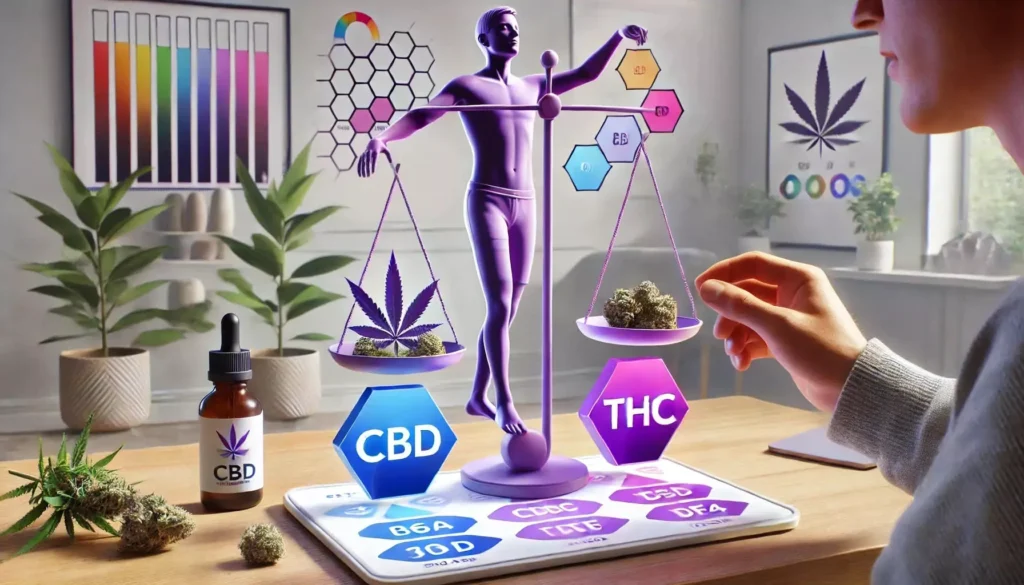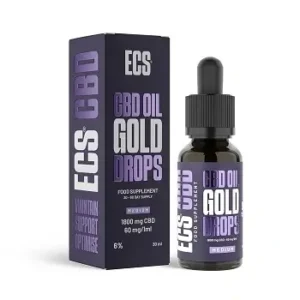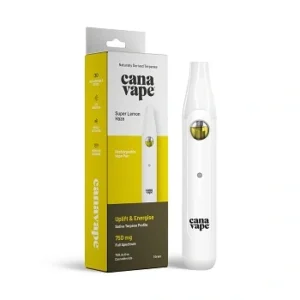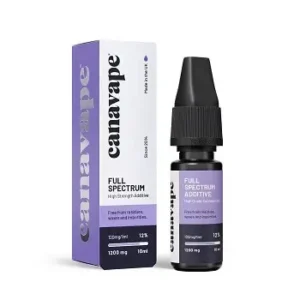
Using CBD to mitigate the effects of THC has become a popular approach among cannabis users seeking a more balanced experience.
The variety of cannabis products available, including different CBD:THC ratios, can significantly impact the overall experience.
While THC is known for its psychoactive properties, it can sometimes lead to unwanted side effects such as anxiety and paranoia especially for first time cannabis users. CBD, a non-psychoactive compound, offers a practical solution by counteracting these negative effects and promoting a calmer state of mind.
This piece will delve into various techniques for using CBD to reduce anxiety and other adverse reactions associated with THC, including tips on vaping CBD for immediate relief.
Discover how incorporating CBD can enhance your cannabis experience and provide a more enjoyable and controlled outcome.
Tetrahydrocannabinol (THC) is the main psychoactive compound found in the cannabis plant. It’s responsible for the ‘high’ sensation that users experience.
THC interacts with the endocannabinoid system in the brain, specifically binding to CB1 receptors, which leads to altered mood, perception, and behaviour.
Understanding THC dose and THC and CBD concentrations in cannabis products is crucial, as higher doses of CBD may increase the adverse effects of THC, leading to stronger subjective drug effects and greater impairment in performance on memory and attention tests.
While many people use THC recreationally for its euphoric effects, it can sometimes cause negative reactions such as anxiety, paranoia, and impaired memory. These side effects can be particularly pronounced in individuals who are sensitive to THC or who consume it in large amounts.
Understanding THC is crucial for those looking to optimise their cannabis experience and minimise adverse effects.
By learning how THC affects the body and mind, users can make informed decisions about their consumption and consider using CBD to mitigate THCs effects with a thc cbd ratio and achieve a more balanced experience.
While THC is celebrated for its psychoactive properties, it can also lead to a range of negative effects. Anxiety and paranoia are among the most common adverse reactions that cannabis users report, especially in individuals who are new to cannabis or consume high doses.
High doses of THC can lead to unpleasant drug effects, including increased heart rate and blood pressure. Some users report a rapid heart rate, also known as tachycardia, which can contribute to feelings of panic. Cognitive impairments such as poor memory and difficulty concentrating can also occur.
Physical symptoms like dry mouth and red eyes are often experienced, though they are generally less concerning. For some, these side effects can outweigh the benefits of THC, making the overall experience less enjoyable.
Understanding these common negative effects is essential for anyone looking to use cannabis responsibly.
By being aware of these potential drawbacks, users can take steps to mitigate them, such as using CBD to counteract THC’s more undesirable effects.
Anxiety is one of the most prevalent negative effects associated with THC consumption. THC can also impact mental health, contributing to anxiety and other psychiatric disorders. This psychoactive compound can trigger or exacerbate anxious feelings due to its influence on the brain’s endocannabinoid system.
THC increases the release of certain neurotransmitters, such as dopamine, which can lead to heightened arousal and, in some cases, anxiety. For individuals who are particularly sensitive or prone to anxiety disorders, even small amounts of THC can provoke significant anxiety or panic attacks.
This reaction can be distressing and may deter some users from continuing to use cannabis.
Recognising the link between anxiety and THC is crucial for anyone looking to enjoy cannabis without the downside.
By understanding this connection, users can take proactive measures, such as incorporating CBD to mitigate THC effects and promote a more relaxed and enjoyable experience.
Cannabidiol (CBD) is a non-psychoactive compound found in the cannabis plant. Unlike THC, CBD does not produce a ‘high’; instead, it interacts differently with the endocannabinoid system. CBD can help reduce THC-induced psychotic symptoms.
CBD primarily influences CB2 receptors, which are largely found in the immune system, and modulates the effects of CB1 receptors indirectly. This interaction can reduce the psychoactive effects of THC, such as anxiety symptoms and paranoia. CBD also has anti-inflammatory and anxiolytic properties, which help in promoting a state of calm and relaxation.
By balancing the effects of THC, CBD allows users to enjoy the benefits of cannabis without experiencing its more negative side effects. This makes CBD an invaluable tool for those looking to optimise their cannabis experience by trying different thc cbd ratios.
Through understanding how CBD works, users can effectively incorporate it into their regimen to mitigate THC effects and achieve a more balanced and enjoyable outcome.
Scientific research supports the use of CBD to mitigate THC effects. A study funded by the National Institutes of Health National Center for Complementary and Integrative Health supports the use of CBD to mitigate THC effects.
Multiple studies have shown that CBD can counteract the psychoactive properties of THC. For instance, a study published in the “Journal of Psychopharmacology” found that CBD reduced anxiety and cognitive impairment in participants administered THC. Another study in the “British Journal of Psychiatry” demonstrated that CBD could lower the paranoia and memory deficits induced by THC.
These findings suggest that CBD’s interaction with the endocannabinoid system plays a crucial role in modulating THC’s effects. Additionally, animal studies have indicated that CBD can reduce the hyperactivity of certain brain regions caused by THC demonstrated using differing thc cbd ratios.
This growing body of scientific evidence provides a solid foundation for using CBD to achieve a more balanced and controlled cannabis experience.
By understanding the research behind this interaction, users can make informed decisions and effectively manage the negative effects of THC.
Patient experiences offer valuable insights into using CBD to mitigate THC effects.
Some patients have reported reduced cannabis dependence when using CBD alongside THC or other cannabis products. Many individuals report finding relief from anxiety and paranoia by incorporating CBD into their cannabis routine at different thc cbd ratios.
For example, Ben, a long-time cannabis user, shared his experience on Cannabis Health News, noting that CBD helped him enjoy the benefits of THC without the overwhelming feelings of anxiety.
Similarly, other patients have highlighted how CBD allows them to consume higher doses of THC without experiencing negative side effects.
These real-world accounts underscore the practical benefits of using CBD alongside THC and cannabis products. Patients often describe a sense of calm and balance, making their overall cannabis experience more enjoyable and manageable.
Such testimonials are crucial for understanding the potential of CBD to improve the effects of THC, providing a more controlled and pleasant experience for users especially those with mental health concerns.
When using CBD to mitigate THC potency, proper dosing is crucial. The right dosage can vary depending on individual tolerance, body weight, and the specific THC or cannabis products used. A common starting point is to begin with a low dose, such as 5-10 mg of CBD, and gradually increase it as needed.
Users should monitor their reactions to find the optimal balance that reduces anxiety and other negative effects without diminishing the desired benefits of THC.
It’s also advisable to consume CBD about 30 minutes to an hour before taking THC, allowing time for the CBD to take effect. For those using edibles or tinctures, this timing can be particularly important. Consulting with a healthcare provider can also offer personalized guidance.
By following these dosing guidelines, users can effectively incorporate CBD into their regimen to achieve a more balanced and enjoyable cannabis experience.

There are several methods of consuming CBD to mitigate THC effects, each offering different benefits.
One of the most popular methods is vaping, which provides immediate relief by quickly delivering CBD into the bloodstream. This can be particularly useful for those who need rapid mitigation of anxiety or paranoia.
Another method is using CBD oil tinctures, which can be taken sublingually for fast absorption or added to food and drinks for a slower, more prolonged effect. Edibles such as gummies or capsules offer a convenient and discreet option, though they may take longer to kick in.
Topical applications, like creams and balms, are generally used for localised relief and are less effective for counteracting the psychoactive effects of THC.
By understanding the various methods of consumption, users can choose the one that best fits their needs and lifestyle, ensuring a more balanced and controlled cannabis experience.
Timing and frequency are key considerations when using CBD to mitigate THCs effects. Ideally, CBD should be taken about 30 minutes to an hour before consuming THC to allow it to start working in the body.
This pre-emptive approach helps ensure that CBD is active in your system when THC takes effect, reducing the likelihood of anxiety or paranoia. For those who consume cannabis regularly, maintaining a consistent CBD regimen can be beneficial.
Taking CBD daily can help build a steady level in the bloodstream, providing ongoing support and making it easier to manage THC’s effects. However, individual needs can vary, and some may find that using CBD only on days when they consume THC is sufficient.
Adjusting the timing and frequency based on personal experience and response will help users find the most effective strategy for a balanced and enjoyable cannabis experience.

Choosing the right device for vaping CBD is crucial for an effective and enjoyable experience. There are several types of vaping devices available, including vape pens, pod systems, and mod kits, each offering unique advantages.
Vape pens are simple, portable, and easy to use, making them an excellent choice for beginners. Pod systems offer a balance between convenience and performance, with refillable pods that can be used for both CBD and THC vaping.
Mod kits are more advanced and customisable, allowing users to adjust settings like temperature and wattage for a tailored experience. When selecting a device, consider factors such as battery life, ease of use, and maintenance requirements.
Additionally, ensure the device is compatible with CBD e-liquids or concentrates.
By choosing the right device, users can optimise their CBD vaping experience, effectively mitigating THC effects and achieving a more balanced and controlled outcome.
Adhering to best practices for vaping CBD ensures a safe and effective experience. Start by selecting high-quality CBD e-liquids or concentrates from reputable suppliers to guarantee purity and potency. Begin with a low dose, taking slow, measured puffs to gauge your body’s response.
This approach helps in avoiding overwhelming effects and allows for gradual adjustment of the dosage. Regularly clean your vaping device to maintain its functionality and enhance the flavour and effectiveness of the CBD. Make sure to follow the manufacturer’s recommendations for maintenance and coil replacement.
Proper storage of CBD products is also important; keep them at room temperature, in a dark place to preserve their potency.
Additionally, stay hydrated, as vaping can sometimes cause dry mouth.
By following these best practices, users can maximise the benefits of vaping CBD, effectively mitigating THC effects and achieving a more balanced and enjoyable cannabis experience.
Vaping safety is paramount for a positive CBD experience. First, always use devices and e-liquids from reputable manufacturers to avoid harmful additives and contaminants. Ensure your device is equipped with safety features like overcharge protection and temperature control.
Avoid using homemade or modified equipment, as these can pose significant risks. It’s also crucial to follow the manufacturer’s instructions for device operation and maintenance. Regularly replace coils and clean the tank to prevent the buildup of residue, which can affect performance and safety.
Additionally, be mindful of the temperature settings; overheating can degrade the quality of CBD and produce harmful by-products.
Store your CBD products and vaping devices out of reach of children and pets.
Finally, listen to your body—if you experience discomfort or adverse effects, stop vaping and consult a healthcare professional. By adhering to these vaping safety tips, users can enjoy the benefits of CBD while minimising potential risks.

Personal accounts offer compelling evidence of the effectiveness of using CBD products to mitigate THC effects. Many individuals have shared their trans-formative experiences, illustrating the practical benefits of this approach.
For instance, Sarah, a recreational cannabis user, found that incorporating CBD into her routine significantly reduced her THC-induced anxiety. She discovered that taking CBD oil 30 minutes before consuming THC helped her maintain a sense of calm and enjoy the euphoric effects without the accompanying paranoia.
Another user, Tom, reported that vaping CBD immediately after using THC provided quick relief from the rapid heart rate and nervousness he often experienced.
These stories highlight the versatility and efficacy of CBD in managing the adverse effects of THC. Such personal accounts offer valuable insights and encouragement for others looking to enhance their cannabis experience, making it more balanced and enjoyable.
Expert opinions further validate the use of CBD to mitigate THC effects. Numerous healthcare professionals and researchers endorse this approach based on scientific evidence and clinical experience. Dr. Ethan Russo, a well-known cannabinoid researcher, has highlighted CBD’s ability to counteract THC’s psychoactive effects, making it a valuable tool for achieving a balanced cannabis experience.
Similarly, Dr. Junella Chin, an integrative cannabis physician, often recommends CBD to her patients who struggle with THC-induced anxiety or paranoia. She finds that CBD helps her patients enjoy the therapeutic benefits of THC without the negative side effects.
These expert endorsements provide a reassuring foundation for individuals considering the use of CBD alongside THC.
By incorporating the insights and recommendations of medical professionals, users can feel more confident in their choice to use CBD to enhance their cannabis experience and achieve a more controlled outcome.
The future of CBD and THC management looks promising as research continues to unveil new insights into their interactions. Advances in cannabinoid science are paving the way for more precise and effective ways to use CBD to mitigate THC effects.
Innovations in product formulations, such as balanced CBD-THC ratios and time-released capsules, offer tailored solutions for users seeking specific outcomes.
Legalisation and increased acceptance of cannabis also encourage further studies and clinical trials, providing a deeper understanding of how these compounds can be used together optimally.
Additionally, personalised medicine approaches, using genetic testing to determine individual responses to cannabinoids, promise to revolutionise how we manage THC’s effects with CBD.
As the industry evolves, users can expect more refined and effective products, enhancing their cannabis experience while minimising negative side effects.
This progress holds significant potential for both recreational users and those seeking therapeutic benefits.